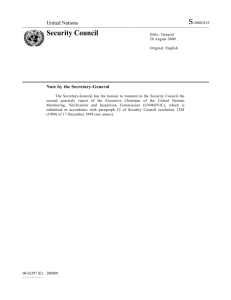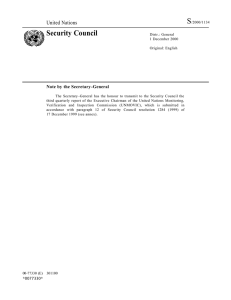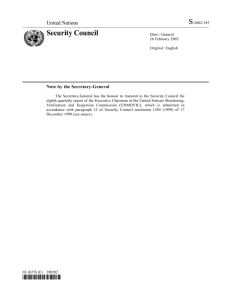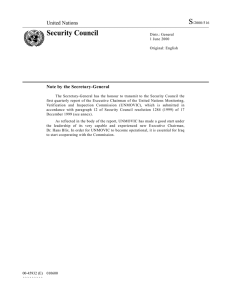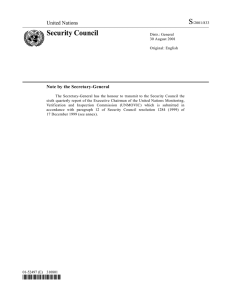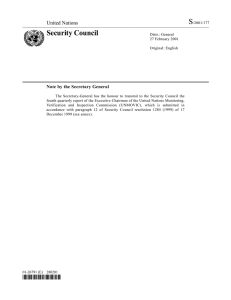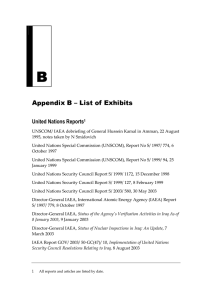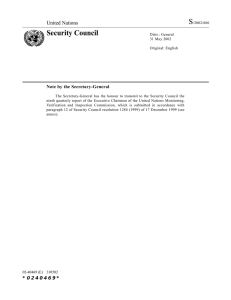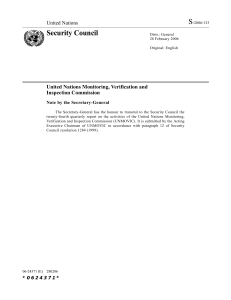S Security Council United Nations Note by the Secretary-General
advertisement
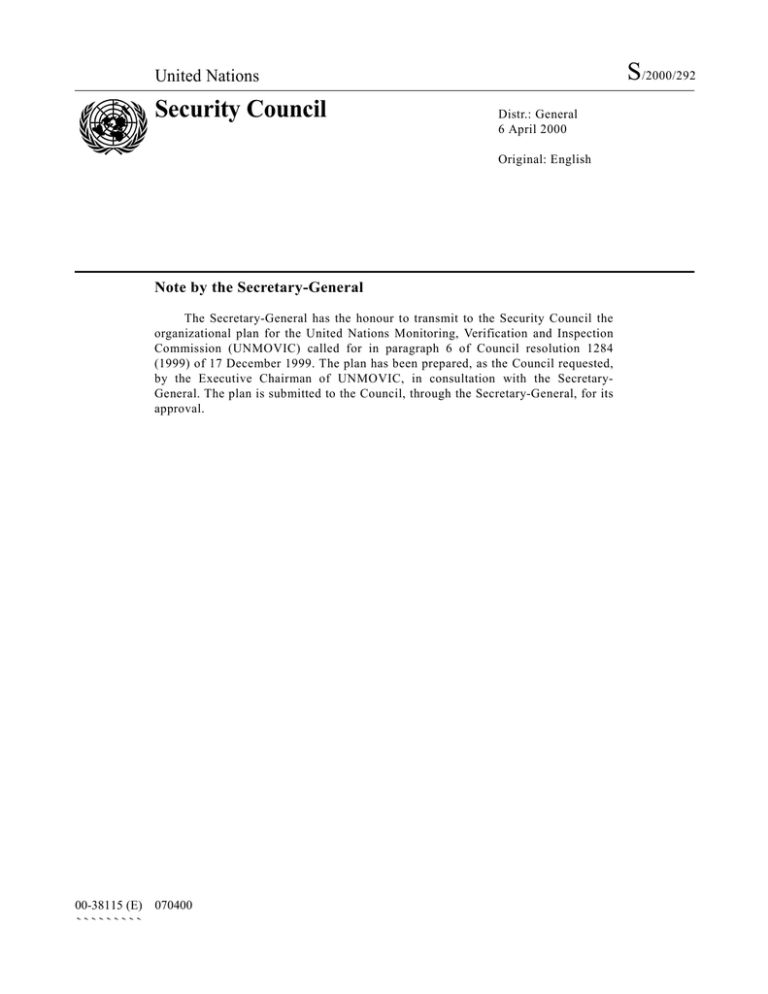
S/2000/292 United Nations Security Council Distr.: General 6 April 2000 Original: English Note by the Secretary-General The Secretary-General has the honour to transmit to the Security Council the organizational plan for the United Nations Monitoring, Verification and Inspection Commission (UNMOVIC) called for in paragraph 6 of Council resolution 1284 (1999) of 17 December 1999. The plan has been prepared, as the Council requested, by the Executive Chairman of UNMOVIC, in consultation with the SecretaryGeneral. The plan is submitted to the Council, through the Secretary-General, for its approval. 00-38115 (E) 070400 ````````` S/2000/292 Organizational plan for the United Nations Monitoring, Verification and Inspection Commission prepared by the Executive Chairman Contents I. II. III. Introduction . . . . . . . . . . . . . . . . . . . . . . . . . . . . . . . . . . . . . . . . . . . . . . . . . . . . . . . . . . Paragraphs Page 1–9 3 A. Cooperative management structure . . . . . . . . . . . . . . . . . . . . . . . . . . . . . . . . . . . 4 3 B. Staffing . . . . . . . . . . . . . . . . . . . . . . . . . . . . . . . . . . . . . . . . . . . . . . . . . . . . . . . . . 5–9 4 Responsibilities of the Commission and obligations of Iraq . . . . . . . . . . . . . . . . . . . 10–16 4 A. Subsidiary organ of the Security Council . . . . . . . . . . . . . . . . . . . . . . . . . . . . . . 10–11 4 B. Verification of compliance by Iraq with its obligations . . . . . . . . . . . . . . . . . . . 12–13 5 C. Reinforced system of ongoing monitoring, verification and inspection . . . . . . 14–16 5 Outline of the organizational structure of the Commission . . . . . . . . . . . . . . . . . . . . 17–41 6 A. College of Commissioners . . . . . . . . . . . . . . . . . . . . . . . . . . . . . . . . . . . . . . . . . . 18 6 B. Executive Chairman . . . . . . . . . . . . . . . . . . . . . . . . . . . . . . . . . . . . . . . . . . . . . . . 19 6 C. Office of the Executive Chairman . . . . . . . . . . . . . . . . . . . . . . . . . . . . . . . . . . . . 20–25 7 D. Division of Planning and Operations . . . . . . . . . . . . . . . . . . . . . . . . . . . . . . . . . . 26–30 7 E. Division of Analysis and Assessment . . . . . . . . . . . . . . . . . . . . . . . . . . . . . . . . . 31–33 8 F. Division of Information . . . . . . . . . . . . . . . . . . . . . . . . . . . . . . . . . . . . . . . . . . . . 34–38 9 G. Division of Technical Support and Training . . . . . . . . . . . . . . . . . . . . . . . . . . . . 39–41 9 H. Administrative Service . . . . . . . . . . . . . . . . . . . . . . . . . . . . . . . . . . . . . . . . . . . . . 42 10 Organization chart . . . . . . . . . . . . . . . . . . . . . . . . . . . . . . . . . . . . . . . . . . . . . . . . . . . . . . . . . . . . . . . 11 Annex 2 S/2000/292 I. Introduction 1. In paragraph 6 of its resolution 1284 (1999) of 17 December 1999, the Security Council requested the Executive Chairman of the United Nations Monitoring, Verification and Inspection Commission (UNMOVIC), within 45 days of his appointment, to submit to the Council, in consultation with and through the Secretary-General, an organizational plan for UNMOVIC. The present plan is submitted in response to that request. 2. The resolution provides that the plan is to cover: (a) The Commission’s structure, staffing requirements, management guidelines and recruitment and training procedures, incorporating as appropriate the recommendations of the panel on disarmament and current and future ongoing monitoring and verification issues (S/1999/356, annex I), and recognizing in particular the need for an effective, cooperative management structure for the new organization; (b) Staffing the Commission with suitably qualified and experienced personnel, who would be regarded as international civil servants subject to Article 100 of the Charter of the United Nations, drawn from the broadest possible geographical base, including, as the Executive Chairman deems necessary, from international arms control organizations, and the provision of high-quality technical and cultural training. 3. The present plan aims, first of all, to secure for UNMOVIC the capacity, staffing, and management that will enable it to fulfil the tasks mandated by the Security Council. At the same time, it endeavours to keep the Commission “lean”, in the sense of keeping the staffing level no higher than is strictly necessary for the performance of its responsibilities and as experience in the field dictates. The structure of UNMOVIC is shown in the annex and is described in section III. The plan incorporates guidelines on management, such as lines of authority, arrangements for cooperation and consultation, need for staff at the managerial level and other senior staff and provisions concerning recruitment and training. In accordance with resolution 1284 (1999), the organizational plan envisages that the Executive Chairman will be provided with professional advice and guidance by the College of Commissioners. In the day-to-day work he will be assisted by his own office, comprising several officials at the senior level. The majority of staff will be placed in four divisions and an administrative service, each headed by a senior official. The four divisions will be for technical support and training, planning and operations (including the Baghdad Ongoing Monitoring, Verification and Inspection Centre), analysis and assessment and information. The staff will be paid by the United Nations and serve under the appropriate United Nations conditions of employment. Rosters will be prepared with the names of persons with special skills and expertise to supplement UNMOVIC staff on inspection teams as required. Such persons will have gone through the training programmes established within UNMOVIC before being included in the rosters. When called upon to serve, they will be given United Nations contracts. Cost-free experts may be engaged only in special circumstances and with the express approval of the Executive Chairman. Reviews of the organizational structure and staffing will naturally have to be undertaken in the light of developments and future needs. The following paragraphs describe how the plan meets the specific requirements cited in paragraph 2 above. A. Cooperative management structure 4. The plan seeks to bring about an effective cooperative management structure. For the fulfilment of the tasks assigned to the Commission, it is indispensable that the different parts of the organization complement each other and cooperate. While this close cooperation calls for openness and discussion within the organization, at the same time the need for strict confidentiality, for example about sites, objects and timing of inspections and about data underlying inspections, will often require that certain information be shared only on a “need-to-know” basis. Nevertheless, a weekly meeting, led by the Executive Chairman and comprising senior and key staff, is envisaged as an important means of ensuring cooperative management and a sense of unity of purpose, mutual assistance and the sharing of as much information as is advisable considering the nature of the various activities undertaken. A similar approach will be followed within each of the divisions so as to strengthen the effectiveness of the organization and to achieve synergy through close cooperation between units and staff. The heads of divisions will have a duty to ensure cohesion within their divisions and 3 S/2000/292 cooperation with other Administrative Service. divisions and the B. Staffing 5. While the United Nations Special Commission (UNSCOM) relied mainly on staff seconded from and paid by national Governments, the present plan envisages that most staff will be United Nations employees subject to Article 100 of the Charter, which requires that they shall neither seek nor receive instructions from any Government and that Member States shall not seek to influence them in the discharge of their responsibilities. The staff will be required to respect strict rules of confidentiality. This will contribute to giving “a clear United Nations identity” to the Commission, to use the language of the report of the panel on disarmament and current and future ongoing monitoring and verification issues (see S/1999/356, annex I, para. 51). It is foreseen that the Division of Technical Support and Training will fulfil the important task of providing technical and cultural training of inspection personnel. 6. A special question concerning staff relates to the transition from UNSCOM to UNMOVIC. About two thirds of the professional staff of UNSCOM have left and some more may still do so. While there will be no automatic transition to United Nations employment contracts for those who are on government contracts and who are still on board, they will be free to apply for the new United Nations positions in competition with other candidates. Previous work will have given them valuable experience and knowledge that could usefully be passed on to new UNMOVIC staff who come on board. A combination of renewal and continuity would minimize the loss of momentum and knowledge that has inevitably occurred during the long absence of inspection and monitoring. 7. Staff recruitment will take place with the aim of securing the highest standards of efficiency, competence and integrity, in accordance with Article 101 of the Charter, and staff, including the staff of inspection teams, will be drawn from the broadest possible geographical base. In recruiting UNMOVIC staff, the gender balance will also be a consideration. In line with paragraph 6 of resolution 1284 (1999), contacts have been established with the International Atomic Energy Agency (IAEA) and the Organization 4 for the Prohibition of Chemical Weapons with a view to cooperation. 8. While the organizational plan is based on the working assumption that Iraq will accept resolution 1284 (1999) and the reinforced system of ongoing monitoring and verification, it may be neither practical nor prudent to move to immediate full recruitment; rather, the adoption of a two-step approach, beginning with prompt action to fill the core needs of staff, to be followed by full recruitment to make UNMOVIC fully operational, might be preferable. 9. As noted in paragraph 3 above, the present plan seeks, first of all, to enable UNMOVIC to fulfil the mandate given to it by the Security Council. For a proper understanding of the plan, therefore, it is necessary to describe the responsibilities conferred upon UNMOVIC in resolution 1284 (1999). Given that the central task of UNMOVIC, like that of UNSCOM before it, is to verify that Iraq complies with the obligations set out by the Council, those obligations, too, are relevant for understanding the Commission’s responsibilities and the demands that their fulfilment place on the organization. Accordingly, the following section briefly sets out the responsibilities of UNMOVIC and the obligations of Iraq. II. Responsibilities of the Commission and obligations of Iraq A. Subsidiary organ of the Security Council 10. In paragraph 1 of its resolution 1284 (1999), the Security Council established UNMOVIC as a subsidiary body of the Council that replaced the Special Commission established pursuant to paragraph 9 (b) of resolution 687 (1991). Such a subsidiary body is created to carry out the collective will of the Council as expressed in resolutions and other forms of Council decisions. Conversely, the subsidiary body may turn to the Council for instructions, guidance and support in its mission. Thus, while they are accountable to the Council for the performance of UNMOVIC and initially report to it every three months, the Executive Chairman of the Commission may bring urgent matters pertaining to the Commission’s mandate to the attention of the Council and ask for its guidance and support, when he deems it to be required. This is S/2000/292 without prejudice to the possibility of seeking advice and guidance from the College of Commissioners. (c) Unconditionally undertake not to use, develop, construct or acquire any of the items referred to above. 11. The specific responsibilities set out by the Security Council for UNSCOM — and taken over by UNMOVIC as its successor — are first defined in resolution 687 (1991), which was adopted on 3 April 1991 and formally accepted by Iraq in conjunction with the ceasefire. They are further defined in other related resolutions, in particular resolutions707 (1991), 715 (1991), 1051 (1996), 1154 (1998) and 1284 (1999). The Council, in its resolution 715 (1991), approved the detailed plans for ongoing monitoring and verification (S/22871/Rev.1 and S/22872/Rev.1 and Corr.1), which are now, under resolution 1284 (1999), to be implemented by UNMOVIC and IAEA. In its resolution 1051 (1996), the Council approved a similarly detailed mechanism for monitoring sales or supplies to Iraq of dual-use or proscribed items. In accordance with paragraph 8 of resolution 1284 (1999), this mechanism is now to be operated by a joint unit established by UNMOVIC and IAEA. Steps are being taken to achieve this. 13. The responsibilities of UNMOVIC, in connection with paragraphs 8 and 9 of resolution 687 (1991), are generally referred to, in resolution 1284 (1999), as “disarmament tasks”, while the responsibilities under paragraph 10 of resolution 687 (1991) relate to implementing the plan for ongoing monitoring and verification. The report of the panel on disarmament and current and future ongoing monitoring and verification issues (S/1999/356, annex I, para. 61) recommended that those two tasks be merged and that a reinforced system of ongoing monitoring and verification capable of addressing, through integration, remaining unresolved disarmament issues be carried out. The organization and management of UNMOVIC must be tailored to implement this system — preparing it, directing it and reporting on it. B. Verification of compliance by Iraq with its obligations 12. Paragraph 2 of resolution 1284 (1999) provides that UNMOVIC will undertake the responsibilities mandated to UNSCOM by the Council with respect to the verification of compliance by Iraq with its obligations under paragraphs 8, 9 and 10 of resolution 687 (1991) and other related resolutions. UNMOVIC thus has the responsibility to verify Iraq’s compliance, with its obligations to: (a) Unconditionally accept the destruction, removal or rendering harmless, under international supervision, of all chemical and biological weapons and all stocks of agents, all related subsystems and components and all research, development, support and manufacturing facilities related thereto, and all ballistic missiles with a range greater than 150 kilometres and related major parts and repair and production facilities; (b) Declare all of its holdings of the foregoing items, agree to immediate on-site inspection of its biological, chemical and missile capabilities and accept the destruction, removal or rendering harmless of those items; C. Reinforced system of ongoing monitoring, verification and inspection 14. In implementing Security Council resolution 1284 (1999) and other relevant resolutions — in particular resolution 715 (1991) and the plan for ongoing monitoring and verification approved thereby — UNMOVIC must be equipped, for example, to verify Iraq’s declarations regarding its proscribed programmes, its periodic reporting on sites subject to monitoring and its notifications under the export/import regime of dual-use items both before and after importation. It must designate sites for inspection and undertake on-site inspections, including no-notice inspections, throughout Iraq. It must be able to conduct interviews with officials and other persons under the authority of the Government of Iraq and analyse documentation provided by or found in Iraq. It must be prepared to take samples to be analysed inside or outside Iraq. It must be equipped to take photographs, both from the ground and in the air. It must be ready to conduct fixed-wing and helicopter flights throughout Iraq in its own aircraft for all relevant purposes, including aerial surveillance. 15. UNMOVIC is required, under paragraph 3 of resolution 1284 (1999), to furnish assistance and cooperation to IAEA in the performance by the latter of its responsibilities under the same paragraph. Furthermore, as mentioned in paragraph 11 above, UNMOVIC and IAEA will jointly operate the 5 S/2000/292 export/import mechanism called for in paragraph 8 of resolution 1284 (1999). The Executive Chairman of UNMOVIC, in consultation with the Director General of IAEA, is to resume revision of the lists to which the monitoring regime applies. 16. UNMOVIC is to have all the rights, facilities, privileges and immunities previously available to UNSCOM under resolution 687 (1991), related resolutions and other decisions of the Security Council, the exchange of letters of May 1991 between the United Nations and Iraq on the status, privileges and immunities of UNSCOM and the plan for ongoing monitoring and verification. Iraq’s full respect for those rights and the fulfilment of its own obligations are evidently decisive, not only to allow UNMOVIC to carry out its duties in Iraq, but also for its Executive Chairman to report, in accordance with paragraph 33 of resolution 1284 (1999), that Iraq has cooperated in all respects. In this regard the Council has placed particular stress on the right of UNMOVIC to have immediate, unconditional and unrestricted access to any and all areas, facilities, equipment, records and means of transport. Together with freedom of movement into, out of and throughout Iraq, by such means as UNMOVIC may deem appropriate, the right of free and prompt access is essential to the discharge by UNMOVIC of its responsibilities. The credibility and effectiveness of all inspection and monitoring increase decisively with decreases in lead times. III. Outline of the organizational structure of the Commission 17. In addition to the College of Commissioners and the Executive Chairman and his support office, UNMOVIC will have the four main divisions and an administrative service. Each division and service will be headed by a senior official. They will consist of functional units led by senior staff. When the Executive Chairman plans to be absent, he will appoint a senior official to act in his place during his absence. If the head of a division or service is to be absent, the Executive Chairman will designate one of the senior staff of that division or service to act in his or her place. 6 A. College of Commissioners 18. A College of Commissioners for UNMOVIC has been appointed by the Secretary-General (S/2000/207), as required by resolution 1284 (1999). The Commissioners, chaired by the Executive Chairman, will meet regularly to review the implementation of resolution 1284 (1999) and other relevant resolutions, and to provide professional advice and guidance to the Executive Chairman, including on significant policy decisions and on written reports to be submitted to the Security Council through the Secretary-General. As such reports are initially required every three months, in accordance with paragraph 12 of resolution 1284 (1999), meetings with the College of Commissioners will be held at least once every three months. It is proposed that the first meeting of the College be held towards the end of May 2000. A senior official will be appointed as Secretary of the College to ensure that the Commissioners are kept informed of the work of UNMOVIC, supplied with proper documentation and provided with a draft agenda before each meeting. The Secretary, who will serve in the Office of the Executive Chairman, will be responsible for preparing summaries of the discussions of the College and for fully recording any conclusions resulting from the sessions. B. Executive Chairman 19. The Executive Chairman is responsible to the Security Council for all of the Commission’s activities. He will thus exercise authority and overall control of its operational and administrative activities and appoint the staff. The functions of the Executive Chairman will include chairing the College of Commissioners and seeking its advice and guidance; formulating policies and guidelines for inspection and monitoring operations; preparing reports to the Security Council as required under resolution 1284 (1999); and briefing the Security Council on all tasks entrusted to UNMOVIC under section C of resolution 687 (1991) and subsequent relevant resolutions, in particular resolution 1284 (1999), especially in providing the Council with assessments relating to monitoring and verification activities and to the status of verification of remaining disarmament issues. S/2000/292 C. Office of the Executive Chairman 20. The Executive Chairman and senior members of his office as instructed by him will maintain the necessary contacts with the Security Council, the Secretary-General, relevant United Nations departments and offices and the members of the College of Commissioners, and will also maintain high-level contacts with Governments, including the Government of Iraq. As noted in paragraph 4 above, weekly meetings between the Executive Chairman and key and senior staff from his office, the four divisions and the Administrative Service will contribute to the cooperative management structure. 21. The Executive Assistant will assist the Executive Chairman in carrying out his responsibilities relating to substantive, organizational, administrative, personnel and budgetary matters. 22. The External Relations Officer will assist the Executive Chairman in the Commission’s relations with Member States and their permanent missions and will handle liaison with organizations in the United Nations system and international arms control organizations. 23. The Activity Evaluation Officer will be responsible for reviewing the functioning of UNMOVIC as a whole, alerting the Chairman to any weaknesses identified and advising him on possible measures to improve the Commission’s performance in the interests of effective management. The Activity Evaluation Officer, in cooperation with the Administrative Service, will also facilitate the internal audit that is to be performed by a unit of the United Nations Secretariat. 24. The Legal Adviser will provide advice to the Executive Chairman and all the units of UNMOVIC on any legal issues arising in the performance of their functions. The Legal Adviser will also provide advice on all issues relating to the facilities, privileges and immunities of UNMOVIC and its personnel arising under the relevant agreements and arrangements, and will, where necessary, maintain liaison with the Office of Legal Affairs of the Secretariat on matters such as contracts and procurement. The Legal Adviser will also assist, as required, in the drafting of correspondence and reports, particularly where they touch on legal issues. 25. The Public Information Officer will manage the Commission’s public and media relations. He or she will follow the media and ensure that the Chairman and UNMOVIC staff are informed about matters of interest, prepare press releases at the request of the Executive Chairman and represent UNMOVIC or arrange for its representation, as appropriate. The Public Information Officer will ensure that there will be a single authoritative point of contact with the media — the Executive Chairman himself or an officer authorized by him to speak on his behalf or on specific subjects or items. D. Division of Planning and Operations 26. The Division of Planning and Operations will be responsible for planning, directing and performing all monitoring, verification and inspection activities in the implementation of the reinforced system of ongoing monitoring and verification and the verification of dual-use items imported into Iraq. It will have four functional units, namely, biological weapons, chemical weapons, ballistic missiles and multidisciplinary inspections and operations. As ongoing monitoring and verification forms a principal component of the Commission’s work, a Baghdad Ongoing Monitoring, Verification and Inspection Centre, with regional offices elsewhere in Iraq, if required (see S/1999/356, annex I, para. 42 (g)), will constitute a vital part of the Division. The Division will be headed by a senior official who, together with the senior staff of the Division, will undertake the overall planning of monitoring, verification and inspection; propose the sites, objectives and timing of inspections and monitoring; decide upon the composition of inspection teams in the light of the objectives of each mission; and propose to the Executive Chairman the appointment of each chief inspector for field duty. 27. Applying the reinforced system of ongoing monitoring and verification, the staff of the weaponsspecific functional units, under the authority of the head of the Division, will endeavour to attain full understanding and clarity regarding the remaining capacity of Iraq in the areas of those weapons, to neutralize this capacity as prescribed by the Security Council and to verify that no new prohibited capacity arises. The staff, in cooperation with the relevant staff in the Division of Analysis and Assessment, will be responsible for formulating plans for implementing the 7 S/2000/292 monitoring system in Iraq in the relevant weapons areas, including identification of the scope of monitoring (sites, facilities, items, materials and activities to be monitored). The staff will prepare comprehensive operational plans and timetables for inspections and monitoring operations under the direction of the head of the Division. In cooperation with other divisions of UNMOVIC, they will propose new inspection and monitoring operations and other field activities. Staff of this Division will perform inspections in the field, rotating with staff in Iraq to serve in the field as chief inspectors or in other capacities. 28. Under the authority of the head of the Division, the functional unit for multidisciplinary inspections and operations will be responsible for verifying information related to identified sales or supplies to Iraq of proscribed items, monitoring the end-use of dual-use items imported by Iraq and conducting inspections for identifying possible undeclared imported notifiable items. It will also act as the focal point for practical cooperation with and assistance to IAEA in carrying out inspections and monitoring operations, and it will plan, coordinate and execute joint on-site inspections and monitoring operations with IAEA. In addition, and in cooperation with other staff of the Division, it will plan and coordinate multidisciplinary inspections of sites related to multiple capabilities, including additional sites. 29. The Baghdad Ongoing Monitoring, Verification and Inspection Centre will provide all the support offices, logistics, communications, transport and so on for inspectors of UNMOVIC and IAEA in Iraq. It will also provide routine analytical services to the teams of inspectors, through the analytical laboratory operating on the premises, and furnish remote monitoring capabilities. The Centre will be headed by a senior official with a deputy. The head of the Baghdad Centre will report to the head of the Division of Planning and Operations on all operational matters. In especially important matters, he may report directly to the Executive Chairman. Authority will be delegated to the Centre to coordinate and perform routine activities, reporting, as appropriate, to the Division of Planning and Operations at Headquarters. Any regional offices in Iraq will, on routine matters, report to the Baghdad Centre but will, on important matters, report directly to the head of the Division. 8 30. The resident inspectors of the Baghdad Centre will perform monitoring in implementation of the reinforced system of ongoing monitoring and verification. They will do so with advice by and subject to the overall coordinating responsibilities of the head of the Centre and on the basis of general planning provisions and guidelines issued by the head of the Division of Planning and Operations at Headquarters. Daily written reports of the monitoring teams from the field to Headquarters will be channelled through the head of the Baghdad Centre. Visiting inspection teams will operate on a similar basis. While in Iraq they will be advised by and be subject to the overall coordinating responsibilities of the head of the Baghdad Centre, but will perform inspections on the basis of specific plans and instructions issued by the head of the Division of Planning and Operations. The latter will provide specific additional instructions when needed, after consultation and as appropriate, with the Executive Chairman, and the head of the Centre will be kept fully informed. Resident inspectors will at intervals rotate back to New York to work at UNMOVIC headquarters and will be replaced in the field by Headquarters staff. In conducting monitoring and inspection operations, effectiveness should be the primary consideration. A rigorous and comprehensive approach is to be adopted to planning and in-field activities. Mandated tasks will be carried out in a correct, technically competent and thorough manner. Denial of access or other lack of cooperation will be immediately reported. E. Division of Analysis and Assessment 31. The Division of Analysis and Assessment will be responsible for analysing and assessing information available to UNMOVIC, in particular the data resulting from the organization’s own activities in the field, but also from other sources, such as information about export/import activities, overhead imagery and outside information. It will make extensive use of the central database. The Division will be headed by a senior official who will report to the Executive Chairman. 32. The Division will have four functional units for analysis and assessment, namely, biological weapons, chemical weapons, missiles and multidisciplinary inspections. These units are counterparts to units within the Division of Planning and Operations, with which they will cooperate closely, inter alia, to clarify S/2000/292 weaponization and disarmament issues and questions relating to Iraq’s production capabilities and acquisitions, to identify additional sites for inspection and to assess the effectiveness of inspection and Iraq’s compliance. New information from the field will be provided by staff of the Division of Planning and Operations. In turn, the latter will be provided with analyses and assessments of the information it has generated as well as of other relevant information for its further planning and operations. 33. The head of the Division, in cooperation with the head of the Division of Planning and Operations and assisted by relevant senior staff from the two divisions, will be responsible for providing to the Executive Chairman a draft quarterly report on UNMOVIC activities for his consideration and for subsequent submission by him to the College of Commissioners. The Division of Analysis and Assessment will also be responsible for compiling, with the cooperation of the Division of Information and the Division of Planning and Operations, a list of remaining disarmament issues from which key issues can be identified. F. Division of Information 34. The Division of Information is the main repository of information that will form the basis for the reinforced system of ongoing monitoring and verification. The Division will continuously integrate new information received from inspections and other sources with relevant existing information, operate the UNMOVIC database and be in charge of the archives. 35. The Division will be headed by a senior official and will comprise functional units and an office for outside information sources. The export/import joint unit foreseen in paragraph 8 of resolution 1284 (1999) will collect relevant information for use in the Division of Analysis and Assessment and the Division of Planning and Operations. The information will provide the basis for monitoring and verification activities regarding dual-use goods and proscribed items. The joint unit will also be responsible for proposing the revision and updating the lists of items and technology to which the mechanism applies. 36. A second functional unit will gather and process overhead imagery, as requested by the Division of Planning and Operations and the Division of Analysis and Assessment. It will also handle imagery that becomes available through inspections and other sources, including Governments, and will interpret relevant information from such imagery. 37. The Office for Outside Information will analyse relevant information from open sources. In addition to the Executive Chairman, it will be the sole entrance point for intelligence provided by Governments in accordance with paragraph 10 of resolution 1284 (1999), in which the Security Council requests that they give full cooperation to UNMOVIC and IAEA in the discharge of their mandates. The official in charge of the Office will critically analyse information obtained and assess its usefulness for inspection and monitoring purposes. The official will report administratively to the head of the Division, but will share sensitive information only with the Executive Chairman and persons whom the latter indicates, in particular staff members who may have use of it in pursuit of the mandate of UNMOVIC as set out by the Council. The flow of intelligence must be one-way only and have regard only to matters relevant to the mandate of UNMOVIC, but dialogue with providers may be necessary in order to seek clarification and to indicate what may be of particular interest to the organization in discharging its tasks. 38. The Data-Processing and Archives Unit will be responsible for establishing, operating and maintaining a central integrated database and the organization’s archives. Information from a variety of sources, including, notably, the results of the Commission’s inspection and monitoring activities, will be stored and systematized in the database. It will be accessible on a “need-to-know” basis, in an efficient and secure manner, for analysis and use in reports and in the planning and operation of inspection and monitoring activities. It will provide advice regarding the Commission’s needs for computer hardware and software and maintain the organization’s computer network. G. Division of Technical Support and Training 39. The Division of Technical Support and Training will plan and provide training and logistical support for inspection and monitoring operations and other missions. In cooperation with United Nations procurement units and Governments, it will secure equipment and supplies for the divisions of UNMOVIC 9 S/2000/292 on the basis of requests and specifications originating from them, and will be responsible for the installation and maintenance of all such equipment. It will provide the international and field system of communications and will arrange for the ground and air transport facilities necessary for field missions. It will develop and review ways and methods of ensuring security. It will also establish and accredit a network of analytical laboratories, according to their capabilities, and arrange for contracts for analysis and for transportation of samples and hazardous material. 40. In cooperation with other divisions, it will develop, organize and run technical and cultural training programmes. The technical programmes will cover weapons technology, relevant civilian industry, monitoring techniques and safety. The cultural programmes will stress the importance of understanding national sensitivities and the proper handling of adversarial situations. 41. The Division will be headed by a senior official who will report to the Executive Chairman. It will have three functional units, namely, for equipment, procurement and analytical services; communications, transportation and security; and training. It will also be responsible for overseeing the operations of a field office outside Iraq. Discussions are under way for the establishment of such an office in Bahrain, in premises that have been expressly built to serve as a field office. This office will provide logistical services and serve as the base for missions going to or coming from Iraq. H. Administrative Service 42. The Administrative Service will be headed by a senior official who will report to the Executive Chairman. It will have functional units for budget and finance; personnel, recruitment, health and safety; and translation and interpretation. It will manage the funds allocated to UNMOVIC and administer its staff in accordance with the relevant United Nations regulations and rules. It will be responsible for the implementation of the United Nations accountability policies through the internal audit system. Under the authority of the head of the Service, the units will provide the requisite services to the organization as a whole. The Service will further carry out the functions relating to the financial management of the offices of UNMOVIC in New York and in the field. 10 S/2000/292 Annex Organization chart of the United Nations Monitoring, Verification and Inspection Commission Security Council College of Commissioners Secretary Secretary-General Executive Chairman External Relations Executive Assistant Activity Evaluation Legal Adviser Public Information Administrative Service Division of Technical Support and Training Division of Planning and Operations Budget and finance Equipment, analytical services, procurement Baghdad Ongoing Monitoring and Verification Centre Personnel, recruitment, health and safety Translation and interpretation Communications, transportation, security Training Division of Analysis and Assessment BW BW CW CW M M Division of Information Export/import joint unit Imagery Multidisciplinary inspections (including export/import and IAEA) Bahrain field office Multidisciplinary inspections (analysis) Outside information sources Data processing and archives BW, biological weapons; CW, chemical weapons; M, missiles. 11
